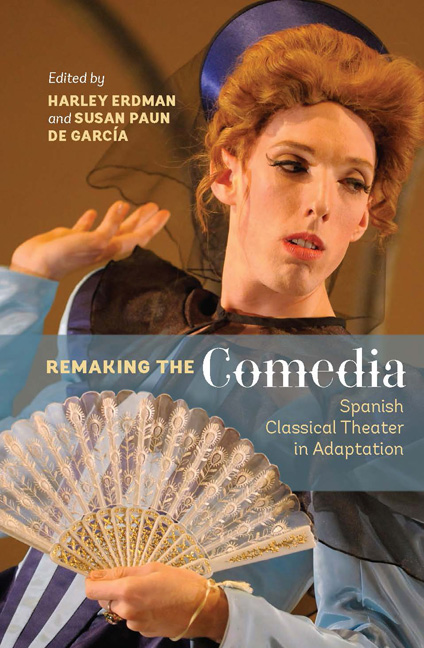Book contents
- Frontmatter
- Contents
- Illustrations
- Contributors
- Preface
- Note to the Reader
- Acknowledgements
- PART I THEORIZING
- PART II SURVEYING
- PART III SPOTLIGHTING
- 11 The Dog in the Manger: The Continuum of Transformation
- 12 El caballero de Olmedo: Los Barracos's Baroque Gentleman
- 13 Corpus Lorqui: Transformation and Transubstantiation in Los Barracos de Federico’s El caballero de Olmedo
- 14 The Phoenix of Madrid: Calderón's No hay burlas con el amor Reborn in Bath
- 15 A Prince in Pittsburgh: “Recasting” a Contemporary Staging of The Constant Prince
- 16 Directing Marta the Divine: Provocative Choices in the Service of the Story
- 17 The Dramaturgy of Absence: Minding the Gaps in Tirso de Molina, Ana Caro, and Feliciana Enríquez
- 18 Translations and Transgressions: Twenty-First-Century Questions Regarding Zayas
- 19 Comedia Actresses, Then and Now: The Case of Ana Caro's Valor, agravio y mujer
- 20 “Kinesthetic Empathy” and the Comedia refundición
- PART IV SHIFTING
- Play Titles Cited
- Works Cited
- Index
16 - Directing Marta the Divine: Provocative Choices in the Service of the Story
from PART III - SPOTLIGHTING
Published online by Cambridge University Press: 05 December 2015
- Frontmatter
- Contents
- Illustrations
- Contributors
- Preface
- Note to the Reader
- Acknowledgements
- PART I THEORIZING
- PART II SURVEYING
- PART III SPOTLIGHTING
- 11 The Dog in the Manger: The Continuum of Transformation
- 12 El caballero de Olmedo: Los Barracos's Baroque Gentleman
- 13 Corpus Lorqui: Transformation and Transubstantiation in Los Barracos de Federico’s El caballero de Olmedo
- 14 The Phoenix of Madrid: Calderón's No hay burlas con el amor Reborn in Bath
- 15 A Prince in Pittsburgh: “Recasting” a Contemporary Staging of The Constant Prince
- 16 Directing Marta the Divine: Provocative Choices in the Service of the Story
- 17 The Dramaturgy of Absence: Minding the Gaps in Tirso de Molina, Ana Caro, and Feliciana Enríquez
- 18 Translations and Transgressions: Twenty-First-Century Questions Regarding Zayas
- 19 Comedia Actresses, Then and Now: The Case of Ana Caro's Valor, agravio y mujer
- 20 “Kinesthetic Empathy” and the Comedia refundición
- PART IV SHIFTING
- Play Titles Cited
- Works Cited
- Index
Summary
Diving into classical texts and exploring what makes them tick, then reconfiguring the storytelling in ways that surprise and intrigue a contemporary audience, has appealed to me since the early 1990s, when I adapted John Gay's The Beggar's opera for a three-woman cast, narrowing the focus in order to make the already farcical social commentary as pointedly about gender roles as Gay's original was about class distinctions. Since then, I have created radical adaptations of The Tempest, The Comedy of Errors, Cocteau's Orphée, The Threepenny Opera, and, most recently, a 1960s musical version of Tartuffe. So, when I was introduced to Spanish Golden Age theater a few years ago by being invited to direct Marta the Divine (Harley Erdman's translation/adaptation of Tirso de Molina's Marta la piadosa) at the University of Massachusetts for the 2009–10 season, my inclination to adapt for an audience of our own time and place was already a part of the way I look at creating a production. Tirso's plays in particular are deliciously rich in recontextualization possibilities—recontextualization not for its own sake but because sometimes it is necessary to shake up a classic text in order to reveal the larger story.
As I started to expand my understanding outward from Marta herself, I gradually realized that every character in the play is hypocritical or deceitful in some way, and that highlighting deceitfulness, behavioral masks, and role-playing would be crucial to my directorial approach. Felipe, the heartthrob of both Marta and lucía, not only disguises himself as a monk but convinces lucía that his love for her, rather than for Marta, is the reason for his disguise. The servants, Inés and pastrana, support the deceits of their masters (Marta and Felipe respectively), while also deceiving them when it suits them. Most of the characters in the play are malleable in their identities and fickle in their feelings of attraction and repulsion. The Ensign, for example, isn't sure whether he should pursue Marta or her sister.
- Type
- Chapter
- Information
- Remaking the ComediaSpanish Classical Theater in Adaptation, pp. 155 - 166Publisher: Boydell & BrewerPrint publication year: 2015



